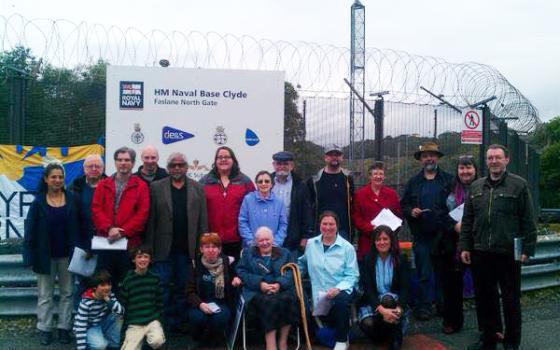“To secure this divine peace for ourselves and procure its blessings for others in the midst of the sin, turmoil and restless anxiety of this modern world is the object of your institute.”
- Bishop Edward Bagshawe
As a Sister of St. Joseph of Peace, I often find myself reflecting on these words, spoken by the Bishop of Nottingham at the profession of our first sisters in 1884. Our religious congregation was founded to promote peace in family life, in the church, and in society in the late 19th century, a time when there was tremendous social upheaval and poverty causing people to flee their native lands in search of a better life.
Today in the early 21st century, there is tremendous poverty and violence forcing millions of people to flee their native lands in search of a better life. In the 131 years since my congregation was founded, the human family has faced two world wars and the onset of the global war on terror. We have developed the capacity to destroy all of God’s creation countless times over with nuclear weapons. Human communities have suffered through more than 250 armed conflicts across the globe since 1945, and civilians now make up the majority of the causalities of war, with some estimates as high as 90 percent. Then, of course, there is the ugly reality of gun violence in our own nation, a reality which only seems to seep into our collective consciousness briefly in the face of tragedies such as the recent shooting at Umpqua Community College in Oregon.
Last week I found myself holding all of this in prayer as I sat in St. Barnabas Cathedral in Nottingham, England, where our first sisters professed their vows in 1884. I could not help but reflect anew on Bishop Bagshawe’s words then to our first sisters. I wondered: What would he make of the sin, turmoil and restless anxiety of our contemporary world which gives rise to such violence? One thing is certain — there continues to be an urgent need for faithful witnesses to peace, compassion and nonviolence today.
I have just returned home after spending a few weeks visiting with sisters in my religious community in our United Kingdom region. Consequently, I missed the excitement of the U.S. papal visit and had to follow it at a distance online. During a long train ride to Scotland, I read the address of Pope Francis to Congress, which he had given the day before. I knew that while I was in Scotland, I would have the opportunity to join a peace vigil at the Faslane naval base, home to the U.K.’s Trident Deterrent Missile System — a nuclear weapons program. It is not surprising then that I was drawn to one particular passage in the pope’s address:
Being at the service of dialogue and peace also means being truly determined to minimize and, in the long term, to end the many armed conflicts throughout our world. Here we have to ask ourselves: Why are deadly weapons being sold to those who plan to inflict untold suffering on individuals and society? Sadly, the answer, as we all know, is simply for money: money that is drenched in blood, often innocent blood. In the face of this shameful and culpable silence, it is our duty to confront the problem and to stop the arms trade.
These words of Pope Francis were fresh in my mind the next morning, when I joined one of our sisters who ministers in Scotland in her regular Saturday morning activity — welcoming and teaching English to refugees and asylum seekers at the Glasgow Catholic Worker. Before class began, I had the privilege of chatting over a cup of tea with a few of the men who come to the center. They were refugees from the armed conflicts plaguing Sudan and Syria. I listened intently as one young man shared a bit about his dangerous journey and the family he left behind. I was honored that he would share his story with me, and it helped make more real for me the human suffering, loss, and family separation that are the fruit of the global arms trade.
Pope Francis was very clear before Congress, painting a picture that is usually hidden from taxpayers and citizens in countries like ours. We are shocked by the stories of wave upon wave of refugees from war seeking safety in Europe. Our hearts are hopefully touched, and perhaps we are moved to make a donation for humanitarian relief. But ultimately, we feel removed from their reality. These conflicts are happening far away. They are not really our problem.
Yet Pope Francis challenges us to look more deeply at the roots of this violence, and one central root is profit. The United States is the major exporter of weapons, accounting for three quarters of the global arms market. In 2012 alone U.S. arms manufacturers made $66.3 billion in profit in foreign arms sales, money which Pope Francis names as drenched in blood and directly linked to untold suffering. The weapons which are fired in conflicts in Africa and Asia and the Middle East are, most likely, American weapons. This is our problem. We are inextricably linked to the sin, turmoil and restless anxiety forcing millions to leave their homelands today.
In his address to Congress, Pope Francis also raised up the witness of Dorothy Day, the founder of the Catholic Worker movement. “Her social activism, her passion for justice and for the cause of the oppressed, were inspired by the Gospel, her faith and the example of the saints.” She understood that it was important to both work for systemic change and to be in company with poor and marginalized people. One experience informs the other.
It was fitting, then, that following my visit with refugees and asylum seekers at the Catholic Worker, I drove up the coast with several of our sisters to participate in a peace vigil organized by the Catholic Worker at the Faslane nuclear base. They faithfully stand in witness to peace at the base each month, and on this day we were joined by Arun Gandhi, the 82 –year-old grandson of Mahatma Gandhi, who was on a speaking tour of Europe.
Mr. Gandhi told us that he lived with his grandfather for two years as a young boy. When asked what the greatest lesson was that he learned from his grandfather, he shared this wisdom about icons: His grandfather told him that we have a tendency to make great people into icons. We follow them in life, but we worship them in death. He wondered if, after his own death, people would follow him. He suspected they would instead worship him, and not make his cause their cause.
I like to believe that Pope Francis highlighted four great Americans in his speech to Congress — Abraham Lincoln, Martin Luther King, Dorothy Day and Thomas Merton — not to encourage worship but to inspire us to follow them:
Anation can be considered great when it defends liberty as Lincoln did, when it fosters a culture which enables people to ‘dream’ of full rights for all their brothers and sisters, as Martin Luther King sought to do; when it strives for justice and the cause of the oppressed, as Dorothy Day did by her tireless work, the fruit of a faith which becomes dialogue and sows peace in the contemplative style of Thomas Merton.
I am heartened that apparently the Internet searches for Dorothy Day and Thomas Merton skyrocketed after his address. My prayer is that we as a people will be inspired to make their cause our cause. May we work together to secure peace and procure its blessings for all people in the midst of the sin, turmoil and restless anxiety of our world.
[Susan Rose Francois is a member of the Congregation Leadership Team for the Sisters of St. Joseph of Peace. She was a Bernardin scholar at Catholic Theological Union and has ministered as a justice educator and advocate. Read more of her work on her blog, At the Corner of Susan and St. Joseph.]

